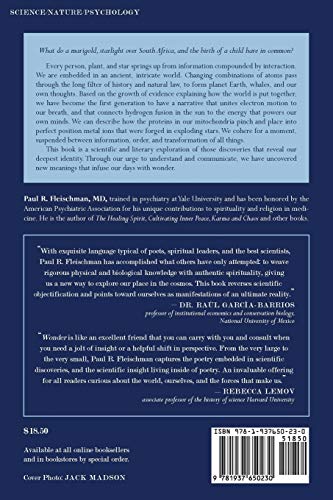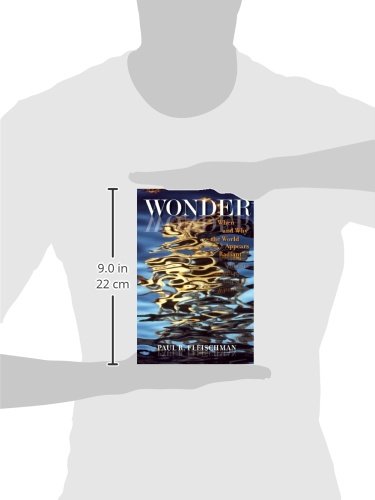



Full description not available
K**Y
Destined to be a classic
It was a pleasure and inspiration to read Wonder: When and Why the World Appears Radiant. Wonder takes us on a journey from the macrocosm of matter, energy, space, and time, down to the microcosm of our individual life and mind. Just as life contains the essence of the universe, similarly the Earth is like an animated, living being: "On Earth as it is in heaven." As Jacob Needleman wrote in his book, An Unknown World, "...We are yearning to bring the two hands together...science in one hand, spiritual striving on the other hand...Earth in one hand, heaven in the other." Fleischman summarizes the latest scientific advances and also surveys contributions from world religion, quoting classics such as Melville, Whitman, Tagore, Neruda, and Asimov. I was reminded of how I struggled during my college religion paper, on my philosophy of life, to define my sense of cosmology. Wonder now helps me to fill in the blanks from that assignment of long ago. The book is arranged for easy reading into eighty manageable chapters within seven sections. The brief chapters resemble elegant Biblical pericopes, the focused prayerful poetry that forms a coherent unit, such as are used by ministers in formulating Sunday sermons. The meticulous, precise, chapters invite a savoring pace for optimal absorption. As I read along, I was often reminded of Davidic songs of praise, not surprisingly, because the sense of wonder often accompanies an attitude of worship. The book reminds us that Einstein praised the cosmic religious feeling. Wonder is written in an eloquent, poetic language that evokes the prose of Fleischman's first book, The Healing Spirit, written a quarter of a century ago, but Wonder soars to new heights of inspiration and is more profound. I can recommend this book simultaneously to the scientist and the humanist, to the religious or to the non-religious, to the mystic as well as to the atheist. Part of Fleischman's appeal to diverse audiences is his ability to empathize with the reader, for example, when, after an extended section on the complexity of biophysics, he asks, "Are you getting tired?" He then reminds us that Walt Whitman, "only glanced up at the stars from time to time." Fleischman adds, "The deeper we probe, the more life expands around us with wonder...We are talking about quadrillions of events and billionths of a second...about a sense of wonder at the limits of our knowledge." This book skillfully slides together realms of science that are often confusingly compartmentalized. For example, "We have been born from billions-years-old gestation in a womb that held every skill that is available to the universe's inventive combinatorialism...even the ethereal zones of quantum probabilities." Although this is a serious book, it is not without levity. For example, I was relieved when I came upon the sentence on Page 250: "Once again we are encountering a stage where if you feel you are beginning to understand the complexity of life, you don't." Another example of Fleischman's prose creating a relationship with his audience is found in Chapter 73, titled "Law and Freedom," where the last sentence states, "No one can predict my next sentence." The author recurrently provides the reader with a carefully culled set of italicized sentences to highlight a point or to summarize the exposition. These italicized sentences have the power of aphorisms. For example, on Page 278: "Life is an enclosed, self-propagating metabolic system, that manipulates the essence of the universe and reshapes matter and molecules..." Wonder exhibits that special mastery of language and art, which, in Jacob Needleman's words, "...have the power to evoke in us the fleeting taste of the higher consciousness that created them." This book is not only scientific, and artistically powerful, but it is also socially conscious, evoking our concerns to better care for the Earth, for other people, and for ourselves. It is written with a full range of emotion and a wide array of personal experience, from bedazzled to bedeviled, blessed to horrified, reverential to activated. The author's voice comes over to us with open-endedness, tolerance of ambiguity, acceptance of uncertainty, commitment to an endless quest for truth, embracing the strengths and weaknesses of being human, and lifted up above them all, the gift of wonder. In the Preface we read that, "Wonder emerges from a certain degree of confidence coupled to a kind of unknowing, and it is blackened out of existence by anxious entrenchment or conviction. By dwelling on wonder for so long I hope I have added to the world and to myself a touch of liberation...I remained inspired by the hope that truth will make us free. Page 8." "Wonder and reverence are the royal marriage. Page 9." Taking his stand within scientific information and personal syntheses, Fleischman writes, "All of the massive evidence of the great twentieth century points towards nothing that resembles a person guiding the universe, and reveals equally forcefully that somewhere in its deep pulsations the world has directive."Review by:Rev. William N. Grosch MD is a psychiatrist and a minister.He has been Professor of Psychiatry at Albany Medical College,Director of Pastoral Services for the New York StateCapitol District Psychiatric Center, Albany, NYand an ordained Minister in the United Church of Christ.
J**A
A Radiant Book
I am writing this review in Moab, Utah, on the banks of the mighty Colorado River with towering red cliffs all around. I have just finishing reading, Wonder: When and Why the World Appears Radiant after a four-month journey. Mostly, I read a chapter or two before going to sleep. Touching into the text this way somehow put my day into a most beneficial perspective and provided a relaxed surrender to the dream world. At the end of the day, I also seemed more open to what the book was exploring. Sometimes I would read aloud to my wife. She has been waiting for me to finish the book so that she could have it, and so just this morning, I was able to hand it off to her. I said: “This is a masterpiece.” I have read many books by Paul R. Fleischman but Wonder takes the cake. What have I learned about wonder? Somehow, I am more able to see below the surface veneer of people and situations, into the depths of things, a seeing which seems to expand on and on. At such moments, I am mostly amazed that anything works and stays coordinated and functioning at all, given the almost infinite causes and conditions, energies and information in dynamic change. I will most likely read the book all over again. It opens up new, yet strangely familiar, even ancient perspectives of depth and even reverence, and a feeling of knowing so little, humbleness coming along with it. This experience is very helpful for my teaching and learning and for just being an ordinary person. The role of awareness in the emerging world feeds back into the frothing moment, and helps me to integrate the experiences from my reading with ongoing daily life. Wonder: When and Why the World Appears Radiant, is a beautiful and much needed contribution of information to our emerging world and I hope it has a wide influence, feeding back into and enhancing the universe’s ability to wonder about itself.
Trustpilot
1 week ago
5 days ago